Sir John Monash, Personal Files Book 13, 1 July - 16 August 1916, Part 13
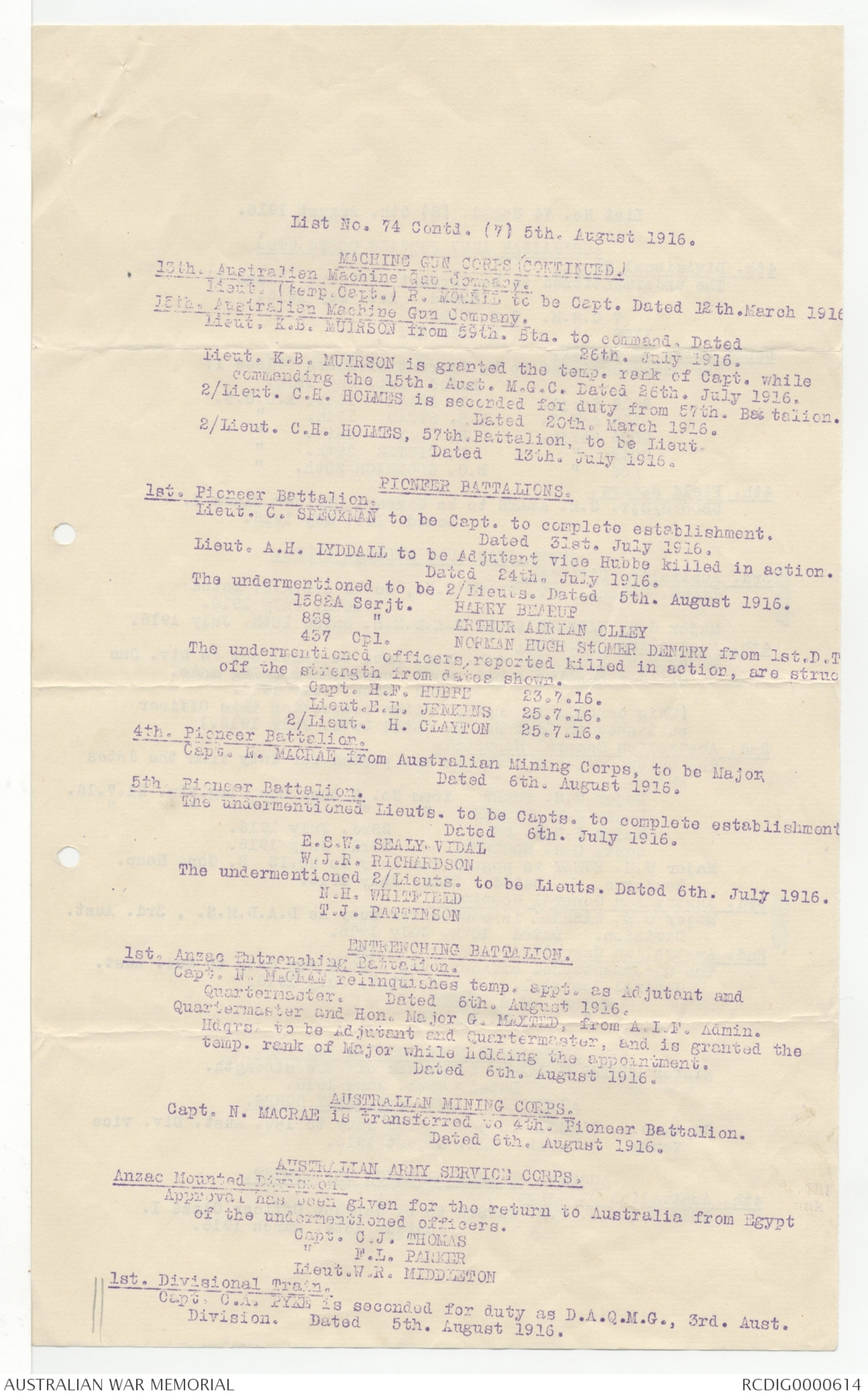
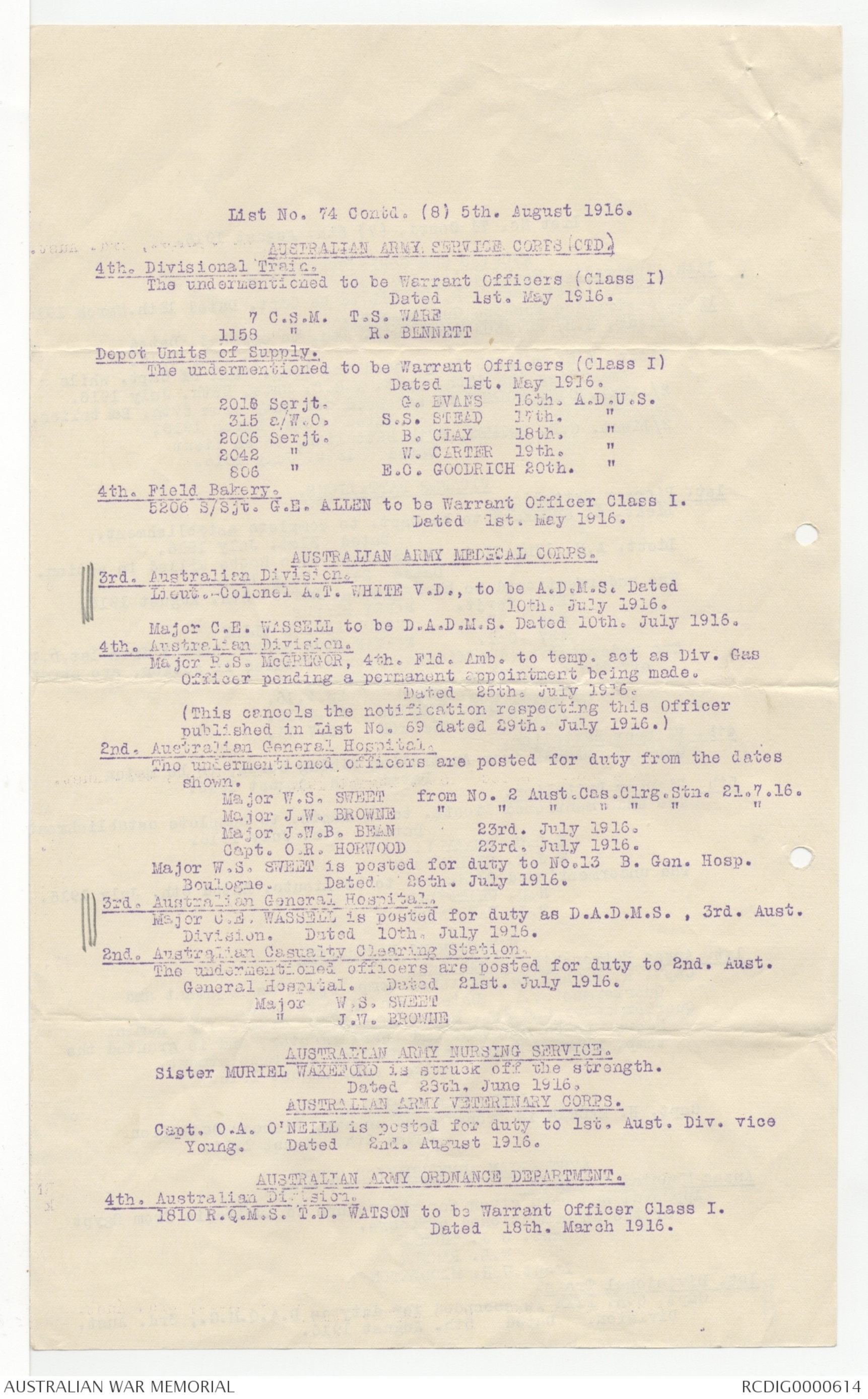
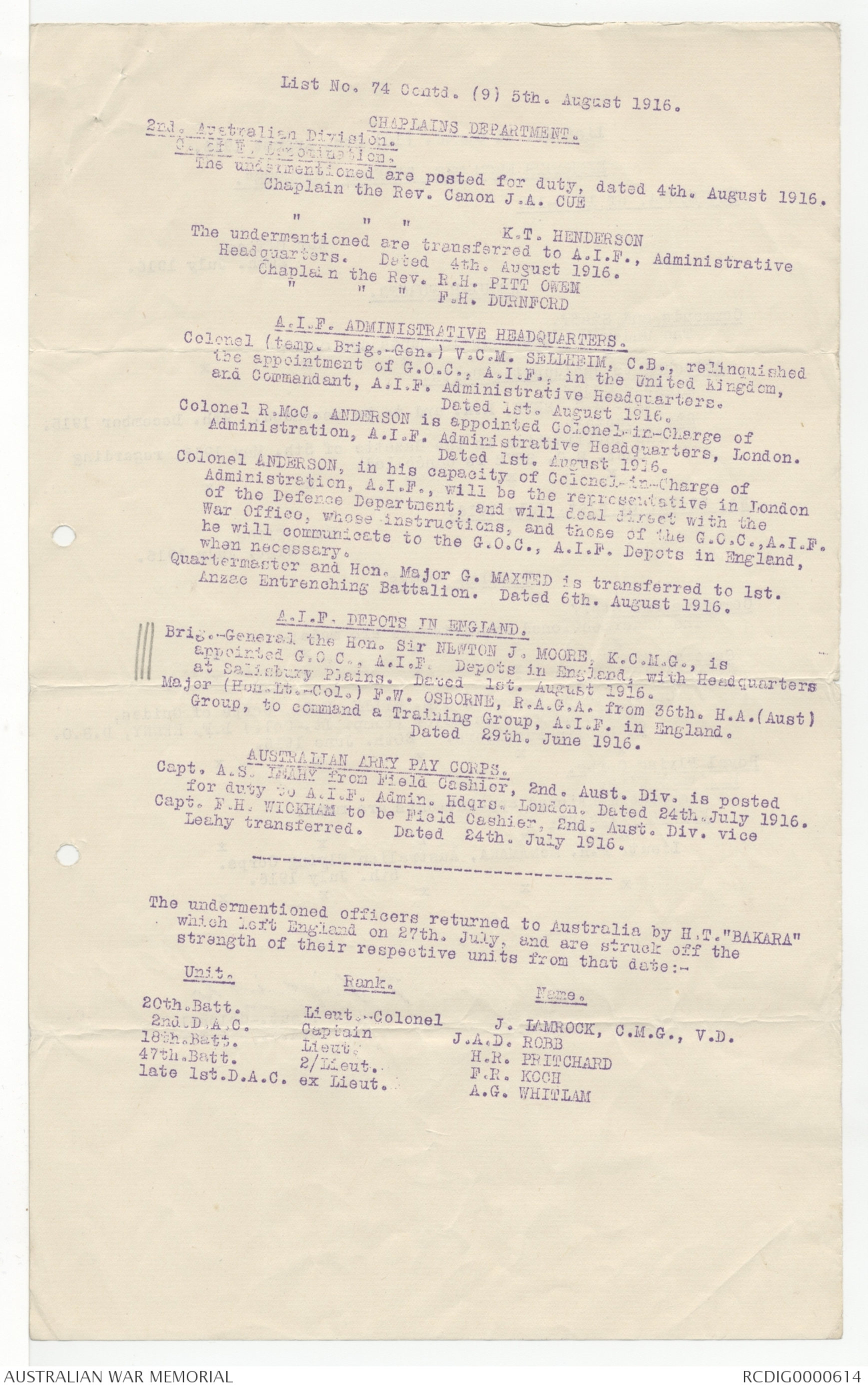
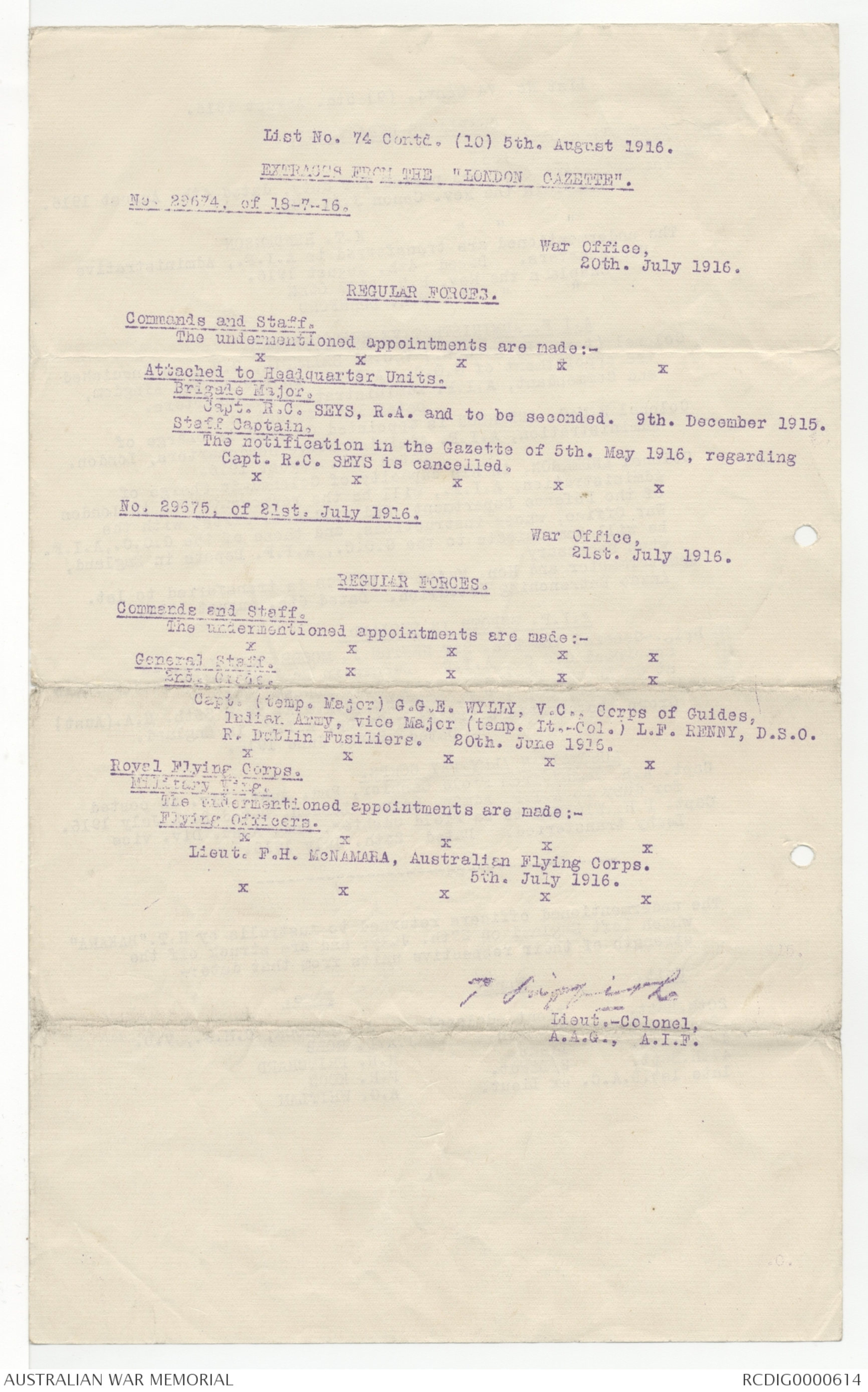
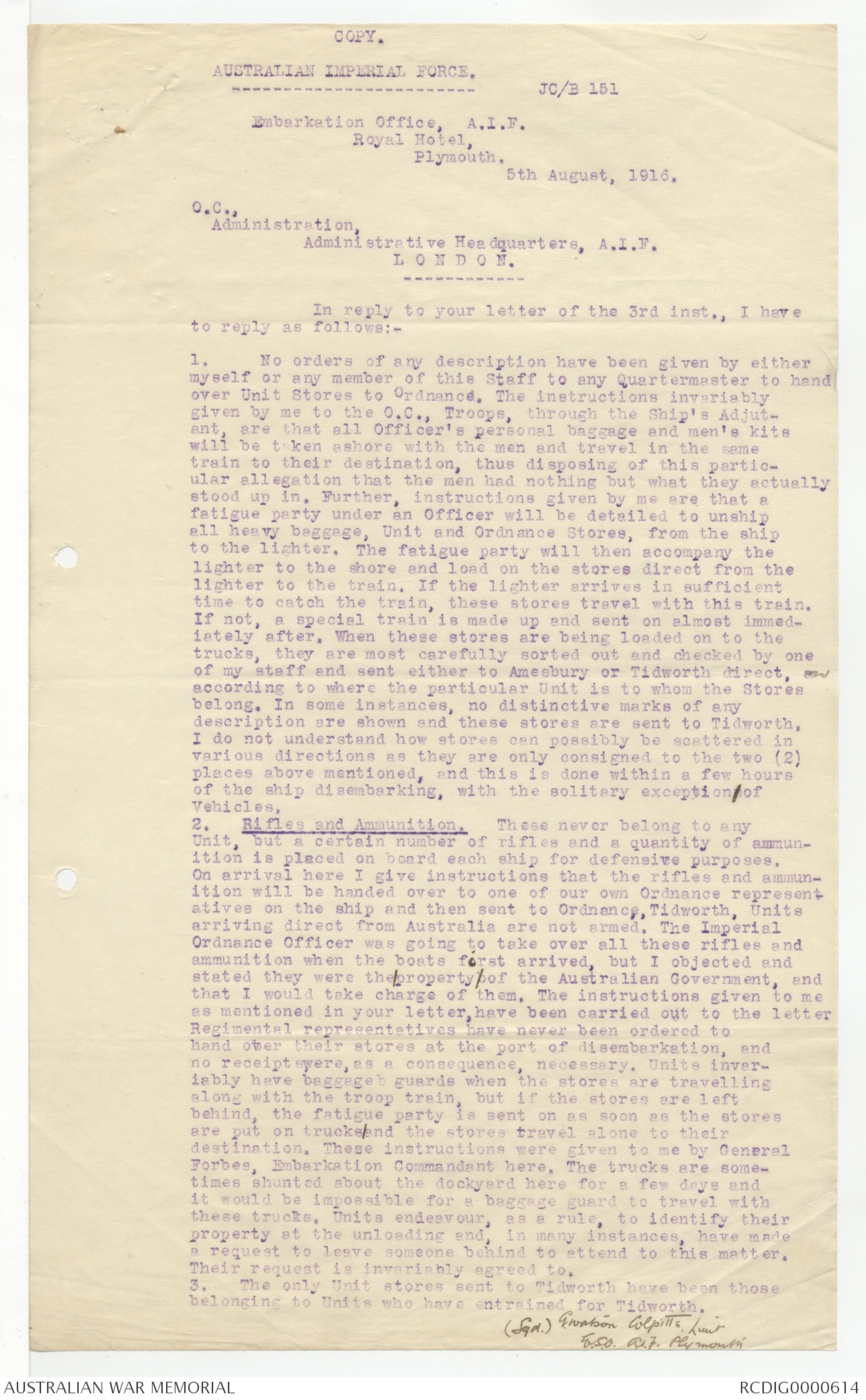
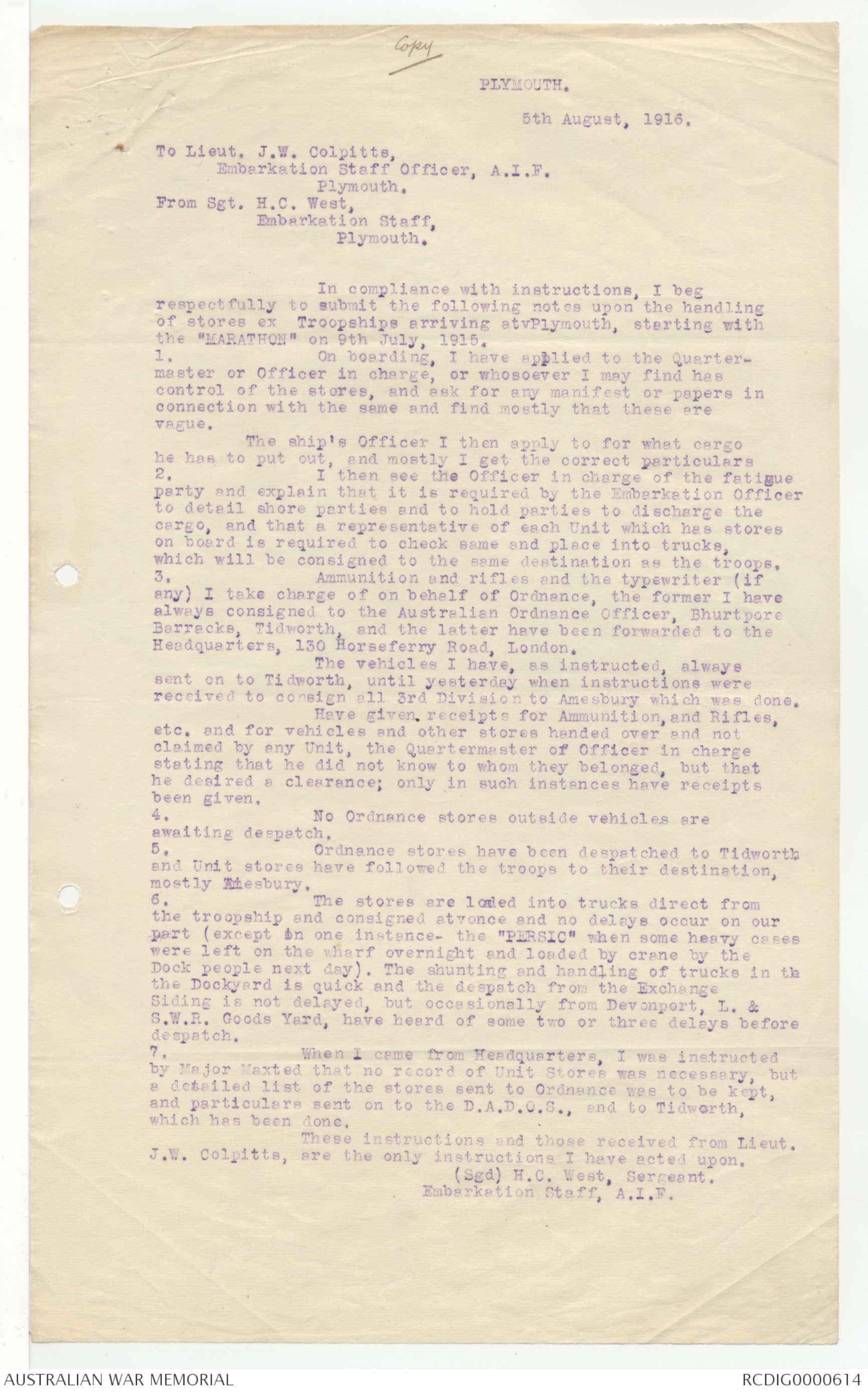
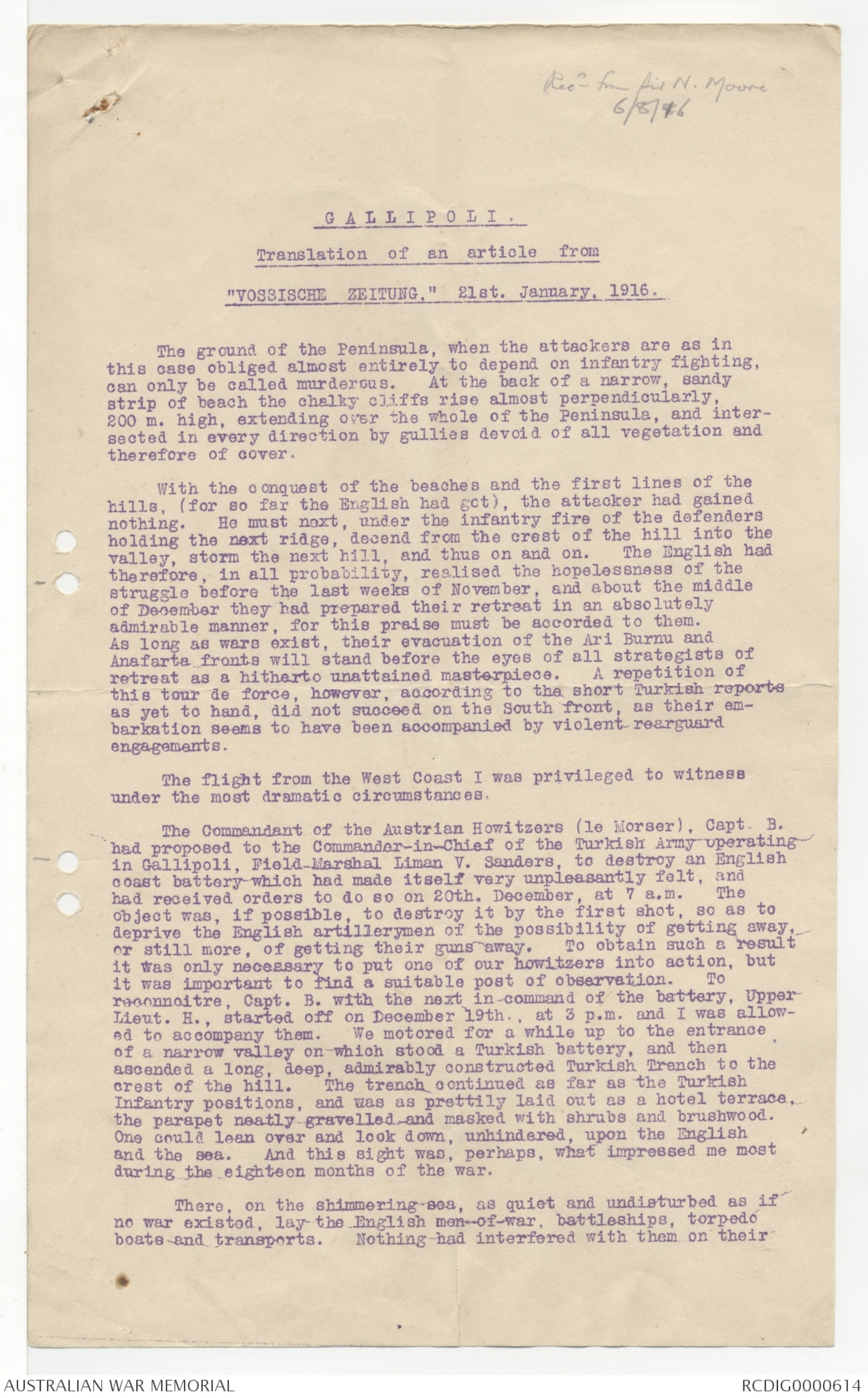
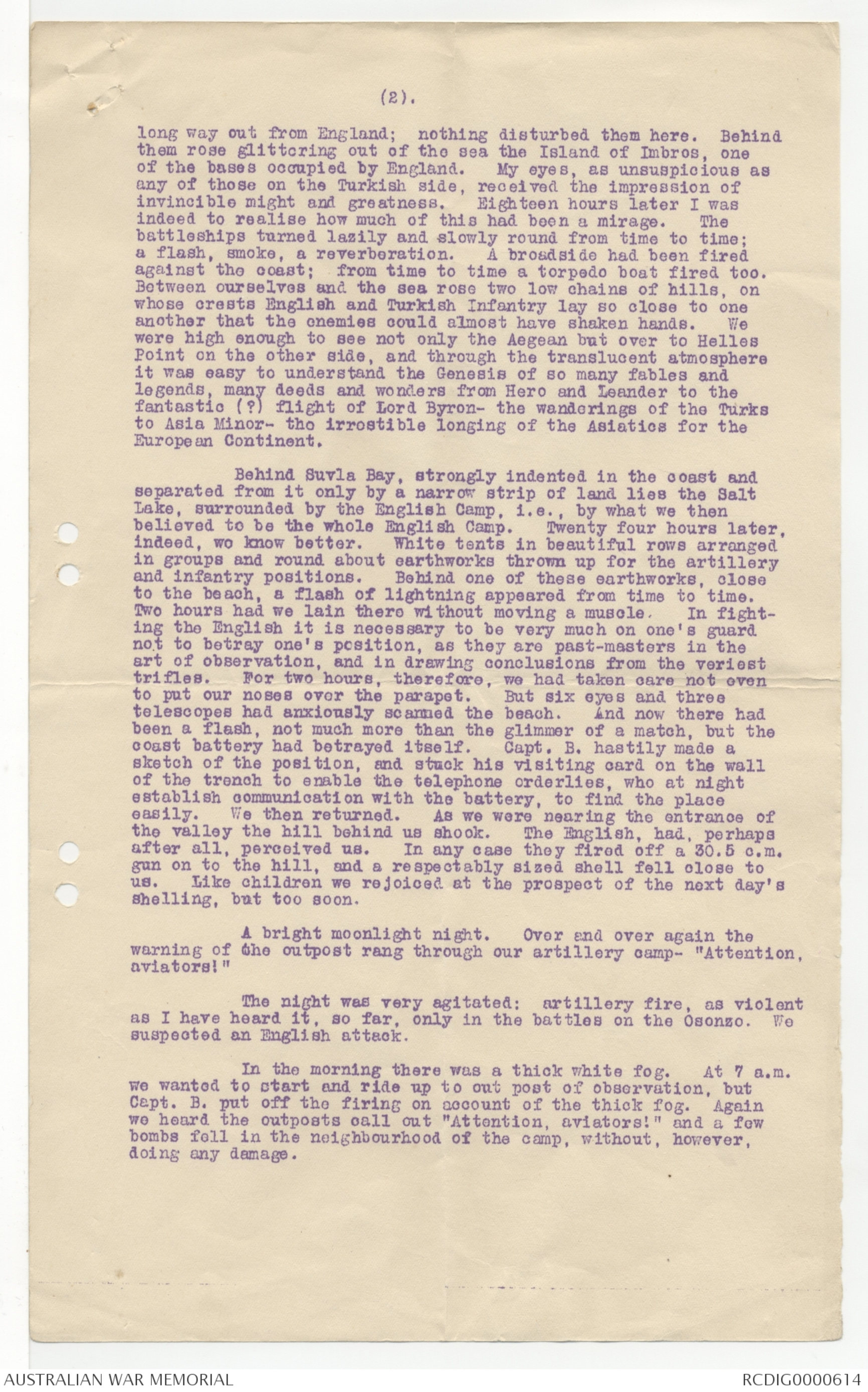
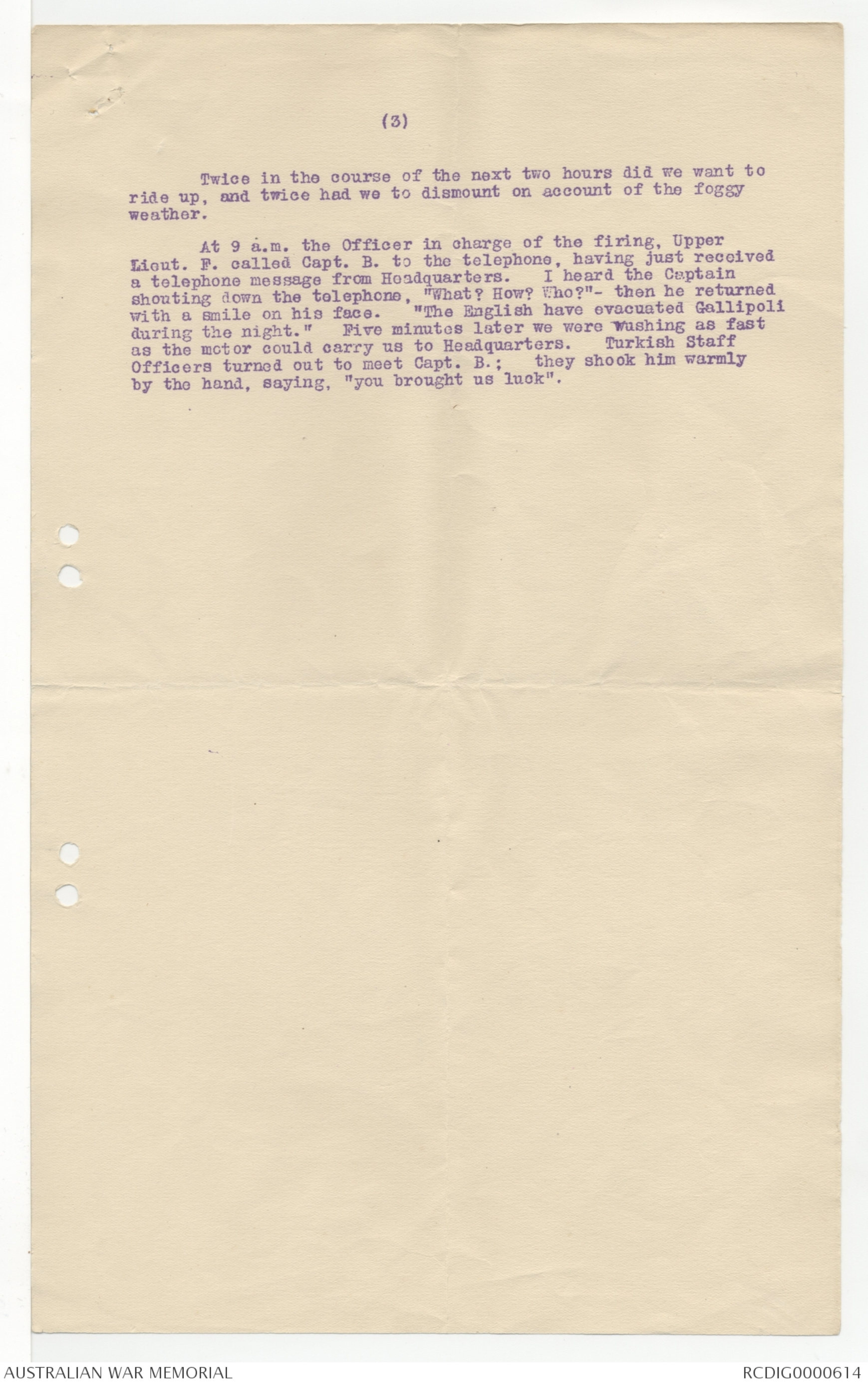
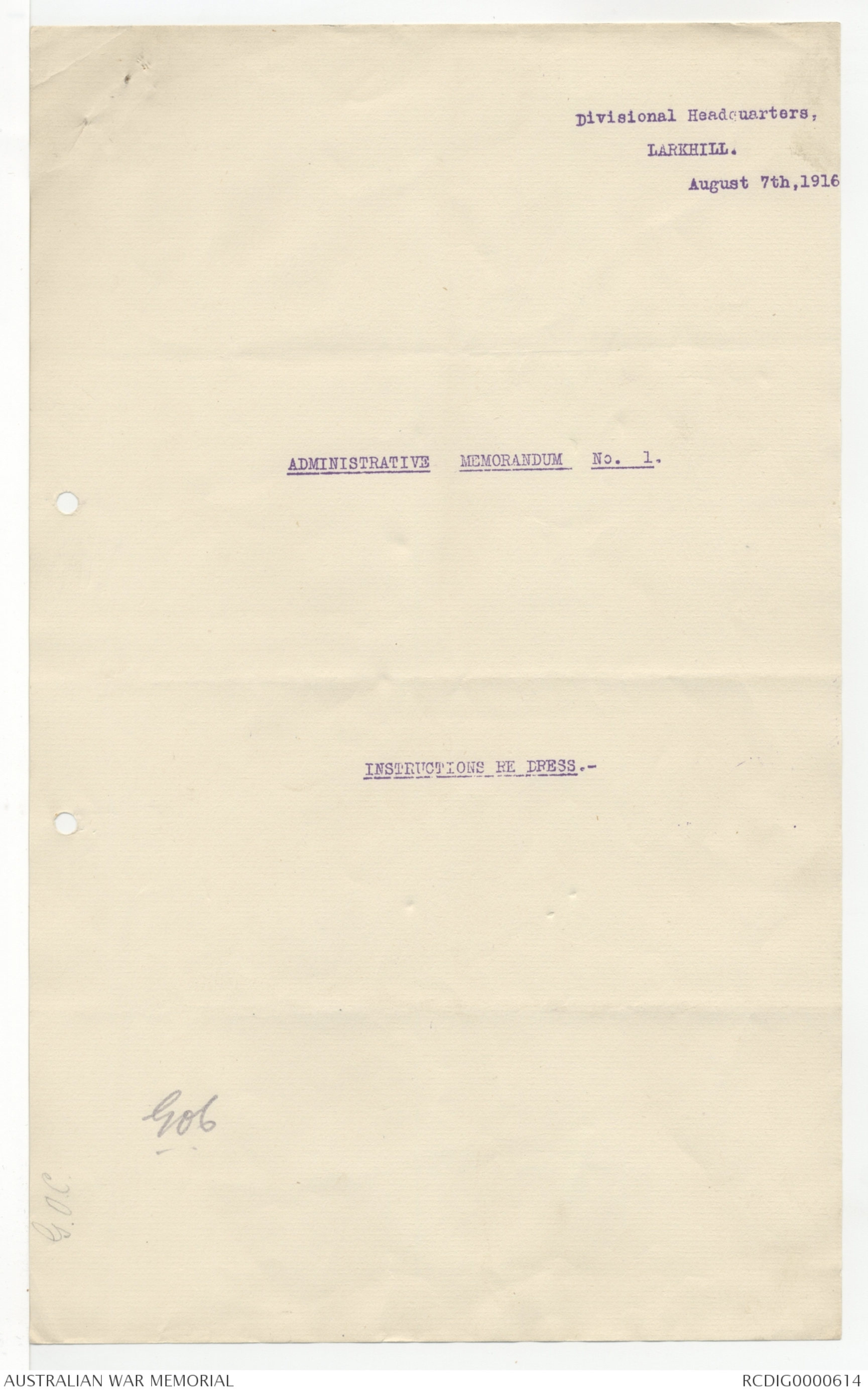
List No. 74 Contd. (7) 5th. August 1916.
MACHINE GUN CORPS (CONTINUED.)
13th. Australia Machine Gun Company.
Lieut. (temp Capt.) R E. MORELL to be Capt. Dated 12th. March 1916
15th. Australian Machine Gun Company.
Lieut. K.B. MUIRSON from 59th. Btn. to command. Dated
26th. July 1916.
Lieut. K.B. MUIRSON is granted the temp, rank of Capt. while
commanding the 15th. Aust. M.G.C. Dated 26th. July 1916.
2/Lieut. C.H. HOLMES is seconded for duty from 57th. Battalion.
Dated 20th. March 1916.
2/Lieut. C.H. HOLMES, 57th. Battalion, to be Lieut.
Dated 13th. July 1916.
PIONEER BATTALIONS.
1st. Pioneer Battalion.
Lieut C. SPECKMAN to be Capt. to complete establishment.
Dated 31st. July 1916.
Lieut. A.H. LYDDALL to be Adjutant vice Hubbe killed in action.
Dated 24th. July 1916.
The undermentioned to be 2/Lieuts. Dated 5th. August 1916.
1582A Serjt. HARRY BEARUP
838 " ARTHUR ADRIAN OLLEY
457 CPL. NORMAN HUGH StOMER DENTRY from 1st. D.T
The undermentioned officers, reported killed in action, are struck
off the strength from dates shown.
Capt. H.F. HUBBE 23.7.16.
Lieut.E.E. JENKINS 25.7.16
2/Lieut. H. CLAYTON 25.7.16
4th. Pioneer Battalion.
Capt. N. MACRAE from Australian Mining Corps, to be Major,
Dated 6th. August 1916.
5th. Pioneer Battalion.
The undermentioned Lieuts. to be Capts. to complete establishment
Dated 6th. July 1916.
E.S.W SEALY VIDAL
W.J.R. RICHARDSON
The undermentioned 2/Lieuts. to be Lieuts. Dated 6th. July 1916.
N.H. WHITFIELD
T.J. PATTINSON
ENTRENCHING BATTALION.
1st Anzac Entrenching Battalion.
Capt. N MACRAE relinquishes temp. appt. as Adjutant and
Quartermaster. Dated 6th. August 1916.
Quartermaster and Hon. Major G. MAXTED, from A.I.F. Admin.
Hdqrs. to be Adjutant and Quartermaster, and is granted the
temp. rank of Major while holding the appointment.
Dated 6th. August 1916.
AUSTRALIAN MINING CORPS.
Capt. N. MACRAE is transferred to 4th. Pioneer Battalion.
Dated 6th. August 1916.
AUSTRALIAN ARMY SERVICE CORPS.
Anzac Mounted Division
Approval has been given for the return to Australia from Egypt
of the undermentioned officers.
Capt. C.J. THOMAS
" F.L. PARKER
Lieut.W.R. MIDDLETON
1st. Divisional Train
Capt. C.A. PYKE is seconded for duty as D.A.Q.M.G., 3rd. Aust.
Division. Dated 5th. August 1916.
List No. 74 Contd. (8) 5th. August 1916.
AUSTRALIAN ARMY SERVICE CORPS (CTD)
4th Divisional Train
The undermentioned to be Warrant Officers (Class I)
Dated 1st. May 1916.
7 C.S.M T.S. WARE
1158 " R. BENNETT
Depot Units of Supply.
The undermentioned to be Warrant Officers (Class I)
Dated 1st. May 1916.
2018 Serjt. G. EVANS 16th. A.D.U.S.
315 a/W.O. S.S. STEAD 15th "
2006 Serjt. B. CLAY 18th "
2042 " W. CARTER 19th "
806 " E.C. GOODRICH 20th "
4th. Field Bakery
5206 S/Sjt. G.E. ALLEN to be Warrant Officer Class I.
Dated 1st. May 1916.
AUSTRALIAN ARMY MEDICAL CORPS.
3rd. Australian Division.
Lieut.-Colonel A.T. WHITE V.D., to be A.D.M.S. Dated
10th. July 1916.
Major C.E. WASSELL to be D.A.D.M.S. Dated 10th. July 1916.
4th. Australian Division.
Major P.S. McGREGOR, 4th. Fld. Amb. to temp. act as Div. Gas
Officer pending a permanent appointment being made.
Dated 25th. July 1916.
(This cancels the notification respecting this Officer
published in List No. 69 dated 29th. July 1916.)
2nd. Australian General Hospital
The undermentioned, officers are posted for duty from the dates
shown.
Major W.S. SWEET from No. 2 Aust.Cas.Clrg.Stn. 21.7.16.
Major J.W. BROWNE " " " " " " "
Major J.W.B. BEAN 23rd. July 1916.
Capt. O.R. HORWOOD 23rd. July 1916.
Major W.S. SWEET is posted for duty to No.13 B. Gen. Hosp.
Boulogne. Dated 26th. July 1916.
3rd. Australian General Hospital
MAJOR C.E. WASSEL is posted for duty as D.A.D.M.S., 3rd. Aust. Division. Dated 10th. July 1916.
2nd. Australian Casualty Clearing Station.
The undermentioned officers are posted for duty to 2nd. Aust.
General Hospital. Dated 21st. July. 1916.
Major W.S. SWEET
" J.W. BROWN
AUSTRALIAN ARMY NURSING SERVICE.
Sister MURIEL WAKEFORD is struck off the strength.
Dated 28th. June. 1916.
AUSTRALIAN ARMY VETERINARY CORPS.
Capt. O.A. O'NEILL is posted for duty to 1st. Aust. Div. vice
Young. Dated 2nd. August. 1916
AUSTRALIAN ARMY ORDNANCE DEPARTMENT.
4th. Australian Division.
1810 R.Q.M.S. T.D. WATSON to be Warrant Officer Class I.
Dated 18th. March 1916.
List No. 74 Centd. (9) 5th. August 1916.
CHAPLAINS DEPARTMENT.
2nd. Australian Division.
C. of E. Denomination.
The undermentioned are posted for duty, dated 4th. August 1916.
Chaplain the Rev. Canon J.A. CUE
" " " K.T. HENDERSON
The undermentioned are transferred to A.I.F., Administrative
Headquarters. Dated. 4th. August 1916.
Chaplain the Rev. R.H. PITT OWEN
" " " F.H. DURNFORD
A.I.F. ADMINISTRATIVE HEADQUARTERS.
Colonel (temp. Brig. Gen.) V.C.M. SELLHEIM, C.B., relinquished
the appointment of G.O.C., A.I.F., in the United Kingdom,
and Commandant, A.I.F. Administrative Headquarters.
Dated 1st. August 1916.
Colonel R.McC. ANDERSON is appointed Colonel-in-Charge of
Administration, A.I.F. Administrative Headquarters, London.
Dated 1st. August 1916.
Colonel ANDERSON, in his capacity of Colonel-in-Charge of
Administration, A.I.F., will be the representative in London
of the Defence Department, and will deal direct with the
War Office, whose instructions, and those of the G.O.C.,A.I.F.
he will communicate to the G.O.C., A.I.F. Depots in England,
when necessary.
Quartermaster and Hon. Major G. MAXTED is transferred to 1st.
Anzac Entrenching Battalion. Dated 6th. August 1916.
A.I.F. DEPOTS IN ENGLAND.
Brig.-General the Hon. Sir NEWTON J. MOORE. K.C.M.G., is
appointed G.O C., A.I.F. Depots in England, with Headquarters
at Salisbury Plains. Dated 1st. August 1916.
Major (Hon-Lt.-Col.) F.W. OSBORNE, R.A.G.A. from 36th. H.A. (Aust)
Group, to command a Training Group, A.I.F. in England.
Dated 29th. June 1916.
AUSTRALIAN ARMY PAY CORPS.
Capt. A.S. LEAHY from Field Cashier, 2nd. Aust. Div. is posted
for duty to A.I.F. Admin. Hdqrs. London. Dated 24th. July 1916.
Capt. F.H. WICKHAM to be Field Cashier, 2nd. Aust. Div. vice
Leahy transferred. Dated 24th. July 1916.
The undermentioned officers returned to Australia by H.T."BAKARA"
which left England on 27th. July, and are struck off the
strength of their respective units from that date:-
Unit. Ranks. Name.
20th.Batt. Lieut,-Colonel J. LAMROCK, C.M.G., V.D.
2nd D.A.C Captain J.A.D. ROBB
18th.Batt. Lieut H.R. PRITCHARD
47th.Batt. 2/Lieut. F.R KOCH
late 1st.D.A.C. ex Lieut. A.G. WHITLAM
List No. 74 Contd. (10) 5th. August 1916.
EXTRACTS FROM THE "LONDON GAZETTE".
No. 29674. of 18-7-16.
War Office,
20th. July 1916.
REGULAR FORCES.
Commands and Staff
The undermentioned appointments are made:-
X X X X X
Attached to Headquarters Units.
Brigade Major.
Capt. R.C. SEYS, R.A. and to be seconded. 9th. December 1915.
Staff Captain.
The notification in the Gazette of 5th. May 1916, regarding
Capt. R.C. SEYS is cancelled.
X X X X X
No. 29675, of 21st. July 1916.
War Office,
21st. July 1916.
REGULAR FORCES
Commands and Staff.
The undermentioned appointments are made:-
X X X X X
General Staff. X X X X
2nd. Grade.
Capt. (temp. Major) G.G.E. WYLLY, V.C., Corps of Guides,
Indian Army, Vice major (temp. Lt,-Col.) L.F. RENNY, D.S.O
R. Dublin Fusiliers. 20th. June 1916.
X X X X X
Royal Flying Corps.
Military Wing.
The undermentioned appointments are made:-
Flying Officers
X X X X X
Lieut F.H. McNAMARA, Australian Flying Corps.
5th. July 1916.
X X X X X
[[?]]
Lieut,-Colonel,
A.A.G., A.I.F.
COPY.
AUSTRALIAN IMPERIAL FORCE.
JC/B 151
Embarkation Office, A.I.F.
Royal Hotel
Plymouth,
5th August, 1916.
O.C.,
Administration
Administrative Headquarters, A.I.F.
LONDON.
In reply to your letter of the 3rd inst., I have
to reply as follows:-
1. No orders of any description have been given by either
myself or any member of this Staff to any Quartermaster to hand
over Unit Stores to Ordnance. The instructions invariably
given by me to the O.C., Troops, through the Ship's Adjutant,
are that all Officer’s personal baggage and men's kits
will be taken ashore with the men and travel in the same
train to their destination, thus disposing of this particular
allegation that the men had nothing but what they actually
stood up in. Further, instructions given by me are that a
fatigue party under an Officer will be detailed to unship
all heavy baggage, Unit and Ordnance Stores, from the ship
to the lighter. The fatigue party will then accompany the
lighter to the shore and load on the stores direct from the
lighter to the train. If the lighter arrives in sufficient
time to catch the train, these stores travel with this train.
If not, a special train is made up and sent on almost
immediately after. When these stores are being loaded on to the
trucks, they are most carefully sorted out and checked by one
of my staff and sent either to Amesbury or Tidworth direct,
according to where the particular Unit is to whom the Stores
belong. In some instances, no distinctive marks of any
description are shown and these stores are sent to Tidworth,
I do not understand how stores can possibly be scattered in
various directions as they are only consigned to the two (2)
places above mentioned, and this is done within a few hours
of the ship disembarking, with the solitary exception of
Vehicles.
2. Rifles and Ammunition. These never belong to any
Unit, but a certain number of rifles and a quantity of ammunition
is placed on board each ship for defensive purposes.
On arrival here I give instructions that the rifles and ammunition
will be handed over to one of our own Ordnance represent
atives on the ship and then sent to Ordnance, Tidworth, Units
arriving direct from Australia are not armed. The Imperial
Ordnance Officer was going to take over all these rifles and
ammunition when the boats first arrived, but I objected and
stated they were the property of the Australian Government, and
that I would take charge of them, The instructions given to me
as mentioned in your letter, have been carried out to the letter
Regimental representatives have never been ordered to
hand over their stores at the port of disembarkation, and
no receipts were, as a consequence, necessary, Units
invariably have baggage guards when the stores are travelling
along with the troop train, but if the stores are left
behind, the fatigue party is sent on as soon as the stores
ere put on truck and the stores travel alone to their
destination. These instructions were given to me by General
Forbes, Embarkation Commandant here. The trucks are
sometimes shunted about the dockyard here for a few days and
it would be impossible for a baggage guard to travel with
these trucks. Units endeavour, as a rule, to identify their
property at the unloading and, in many instances, have made
a request to leave someone behind to attend to this matter.
Their request is invariably agreed to.
3. The only Unit stores sent to Tidworth have been those
belonging to Units who have entrained for Tidworth.
(Sqd.) G. Watson Colpitts, Lieut
ESO. A.I.F Plymouth
Copy
PLYMOUTH.
5th August, 1916.
To Lieut. J.W. Colpitts,
Embarkation Staff Officer, A.I.F.
Plymouth,
From Sgt. H.C. West,
Embarkation Staff,
Plymouth.
In compliance with instructions, I beg
respectfully to submit the following notes upon the handling
of stores ex Troopships arriving atvPlymouth, starting with
the "MARATHON" on 9th July, 1915.
1. On boarding, I have applied to the Quarter-
master or Officer in charge, or whosoever I may find has
control of the stores, and ask for any manifest or papers in
connection with the same and find mostly that these are
vague.
The ship's Officer I then apply to for what cargo
he has to put out, and mostly I get the correct particulars
2. I then see the Officer in charge of the fatigue
party and explain that it is required by the Embarkation Officer
to detail shore parties and to hold parties to discharge the
cargo, and that a representative of each Unit which has stores
on board is required to check same and place into trucks,
which will be consigned to the same destination as the troops,
3. Ammunition and rifles and the typewriter (if
any) I take charge of on behalf of Ordnance, the former I have
always consigned to the Australian Ordnance Officer, Bhurtpore
Barracks, Tidworth, and the latter have been forwarded to the
Headquarters, 130 Horseferry Road, London.
The vehicles I have, as instructed, always
sent on to Tidworth, until yesterday when instructions were
received to consign all 3rd Division to Amesbury which was done,
Have given receipts for Ammunition, and Rifles,
etc. and for vehicles and other stores handed over and not
claimed by any Unit, the Quartermaster of Officer in charge
stating that he did not know to whom they belonged, but that
he desired a clearance; only in such instances have receipts
been given.
4. No Ordnance stores outside vehicles are
awaiting despatch.
5. Ordnance stores have been despatched to Tidworth
and Unit stores have followed the troops to their destination,
mostly Amesbury.
6. The stores are loaded into trucks direct from
the troopship and consigned atvonce and no delays occur on our
part (except in one instance- the "PERSIC" when some heavy cases
were left on the wharf overnight and loaded by crane by the
Dock people next day). The shunting and handling of trucks in
the Dockyard is quick and the despatch from the Exchange
Siding is not delayed, but occasionally from Devonport, L. &
S.W.R. Goods Yard, have heard of some two or three delays before
despatch.
7. When I came from Headquarters, I was instructed
by Major Maxted that no record of Unit Stores was necessary, but
a detailed list of the stores sent to Ordnance was to be kept,
and particulars sent on to the D.A.D.O.S., and to Tidworth,
which has been done.
These instructions and those received from Lieut.
J.W. Colpitts, are the only instructions I have acted upon.
(Sgd) H.C. West, Sergeant.
Embarkation Staff, A.I.F.
Rec from Sir N. Moore
6/8/16
GALLIPOLI.
Translation of an article from
"VOSSISCHE ZEITUNG," 21st. January, 1916.
The ground of the Peninsula, when the attackers are as in
this case obliged almost entirely to depend on infantry fighting,
can only be called murderous. At the back of a narrow, sandy
strip of beach the chalky cliffs rise almost perpendicularly
200 m. high, extending over the whole of the Peninsula, and
intersected in every direction by gullies devoid of all vegetation and
therefore of cover.
With the conquest of the beaches and the first lines of the
hills, (for so far the English had got), the attacker had gained
nothing. He must next, under the infantry fire of the defenders
holding the next ridge, decend from the crest of the hill into the
valley, storm the next hill, and thus on and on. The English had
therefore, in all probability, realised the hopelessness of the
struggle before the last weeks of November, and about the middle
of December they had prepared their retreat in an absolutely
admirable manner, for this praise must be accorded to them.
As long as wars exist, their evacuation of the Ari Burnu and
Anafarta fronts will stand before the eyes of all strategists of
retreat as a hitherto unattained masterpiece. A repetition of
this tour de force, however, according to the short Turkish reports
as yet to hand, did not succeed on the South front, as their
embarkation seems to have been accompanied by violent rearguard
engagements.
The flight from the West Coast I was privileged to witness
under the most dramatic circumstances.
The Commandant of the Austrian Howitzers (le Morser), Capt. B.
had proposed to the Commander-in-Chief of the Turkish Army operating
in Gallipoli, Field-Marshal Liman V. Sanders, to destroy an English
coast battery which had made itself very unpleasantly felt, and
had received orders to do so on 20th. December, at 7 a. m. The
object was, if possible, to destroy it by the first shot, so as to
deprive the English artillerymen of the possibility of getting away,
or still more, of getting their guns away. To obtain such a result
it was only necessary to put one of our howitzers into action, but
it was important to find a suitable post of observation. To
reconnoitre, Capt. B. with the next in command of the battery, Upper
Lieut. H., started off on December 19th., at 3 p.m. and I was allowed
to accompany them. We motored for a while up to the entrance
of a narrow valley on which stood a Turkish battery, and then
ascended a long, deep, admirably constructed Turkish Trench to the
crest of the hill. The trench continued as far as the Turkish
Infantry positions, and was as prettily laid out as a hotel terrace,
the parapet neatly gravelled and masked with shrubs and brushwood.
One could lean over and look down, unhindered, upon the English
and the sea. And this sight was, perhaps, what impressed me most
during the eighteen months of the war.
There, on the shimmering sea, as quiet and undisturbed as if
no war existed, lay the English men-of-war, battleships, torpedo
boats and transports. Nothing had interfered with them on their
(2).
long way out from England; nothing disturbed them here. Behind
them rose glittering out of the sea the Island of Imbros, one
of the bases occupied by England. My eyes, as unsuspicious as
any of those on the Turkish side, received the impression of
invincible might and greatness. Eighteen hours later I was
indeed to realise how much of this had been a mirage. The
battleships turned lazily and slowly round from time to time;
a flash, smoke, a reverberation. A broadside had been fired
against the coast; from time to time a torpedo boat fired too.
Between ourselves and the sea rose two low chains of hills, on
whose crests English and Turkish Infantry lay so close to one
another that the enemies could almost have shaken hands. We
were high enough to see not only the Aegean but over to Helles
Point on the other side, and through the translucent atmosphere
it was easy to understand the Genesis of so many fables and
legends, many deeds and wonders from Hero and Leander to the
fantastic (?) flight of Lord Byron - the wanderings of the Turks
to Asia Minor- the irrostible longing of the Asiatics for the
European Continent.
Behind Suvla Bay, strongly indented in the coast and
separated from it only by a narrow strip of land lies the Salt
Lake, surrounded by the English Camp, i.e., by what we then
believed to be the whole English Camp. Twenty four hours later
indeed, wo know better. White tents in beautiful rows arranged
in groups and round about earthworks thrown up for the artillery
and infantry positions. Behind one of these earthworks, close
to the beach, a flash of lightning appeared from time to time.
Two hours had we lain there without moving a muscle. In fighting
the English it is necessary to be very much on one's guard
not to betray one's position, as they are past-masters in the
art of observation, and in drawing conclusions from the veriest
trifles. For two hours, therefore, we had taken care not even
to put our noses over the parapet. But six eyes and three
telescopes had anxiously scanned the beach. And now there had
been a flash, not much more than the glimmer of a match, but the
coast battery had betrayed itself. Capt. B. hastily made a
sketch of the position, and stack his visiting card on the wall
of the trench to enable the telephone orderlies, who at night
establish communication with the battery, to find the place
easily. We then returned. As we were nearing the entrance of
the valley the hill behind us shook. The English, had, perhaps
after all, perceived us. In any case they fired off a 30.5 c.m.
gun on to the hill, and a respectably sized shell fell close to
us. Like children we rejoiced at the prospect of the next day's
shelling, but too soon.
A bright moonlight night. Over and over again the
warning of the outpost rang through our artillery camp- Attention,
aviators!"
The night was very agitated: artillery fire, as violent
as I have heard it, so far, only in the battles on the Osonzo. We
suspected an English attack.
In the morning there was a thick white fog. At 7 a.m.
we wanted to start and ride up to out post of observation, but
Capt. B. put off the firing on account of the thick fog. Again
we heard the outposts call out "Attention, aviators!" and a few
bombs fell in the neighbourhood of the camp, without, however,
doing any damage.
(3)
Twice in the course of the next two hours did we want to
ride up, and twice had we to dismount on account of the foggy
weather.
At 9 a.m. the Officer in charge of the firing, Upper
Lieut. F. called Capt. B. to the telephone, having just received
a telephone message from Headquarters. I heard the Captain
shouting down the telephone, "What? How? Who?"- then he returned
with a smile on his face. "The English have evacuated Gallipoli
during the night." Five minutes later we were wushing as fast
as the motor could carry us to Headquarters. Turkish Staff
Officers turned out to meet Capt. B.; they shook him warmly
by the hand, saying, "you brought us luck".
Divisional Headquarters,
LARKRILL.
August 7th, 1916
ADMINISTRATIVE MEMORANDUM No. 1.
INSTRUCTIONS RE DRESS.
G06
 Maralyn K
Maralyn KThis transcription item is now locked to you for editing. To release the lock either Save your changes or Cancel.
This lock will be automatically released after 60 minutes of inactivity.